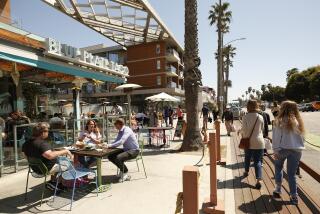Czech-point: According to the National Assn. of...
- Share via
Czech-point: According to the National Assn. of Visa Services, U.S. travelers planning a trip of less than 30 days to Czechoslovakia no longer need advance visas. Visitors will fill out an entry form and pay a $25 fee upon arrival in Czechoslovakia, which has promised to try to process passengers promptly.
Soviet buildup: Intourist will build or renovate eight hotel properties in Moscow and Leningrad by the end of 1991. A total of 4,200 hotel beds in Moscow and 3,500 in Leningrad are expected to be added through the program, representing total room increases of 10% and 11%, respectively. The eight properties are part of a larger Intourist plan valued at $1.6 billion (U.S.) to construct and refurbish 30 hotels throughout the Soviet Union by the end of 1991. Chief among the Moscow developments is the Radisson Slavjanskaya Hotel and Business Centre, a 430-room hotel and 155-suite business center being built at the Kiev Railway Station. Construction has been under way for several years and the hotel will open this fall, according to Soviet and U.S. officials.
The Soviet Union received approximately 80,000 visitors from the United States last year, and expects a 5% increase in 1990.
Help to come: Travelers whose package holidays go awry should, beginning in 1993, have greater rights of redress from European Community-based tour operators under a directive approved by consumer affairs ministers of the member countries.
But the ministers, meeting in Luxembourg recently, decided to ignore various amendments presented by the European Parliament and backed by the Brussels Commission that would have set more precise rules on compensation, tougher limits on last-minute price surcharges and a more specific remedy procedure.
Karel Van Miert, the EEC commissioner responsible for both transport and consumer protection, said that he would closely monitor the new measure to see if it should be strengthened by further legislation.
On the go: More Americans traveled in 1989 than ever before, amassing nearly 1.26 billion person-trips, a 2% increase over 1988, according to the U.S. Travel Data Center. (A person-trip measures one person traveling 100 miles or more away from home.)
Total travel increased for the fifth consecutive year in 1989 and has increased more than 23% during the five-year period.
Vacation and weekend travel enjoyed banner years in 1989. Vacation travel jumped 6% to total more than 878 million person-trips, and weekend travel rose 4% to more than 582 million person-trips.
Traveling by automobile, truck or RV was again the most popular mode of transportation in 1989, increasing 3% over 1988. More than 78% of all travel was auto-related in 1989, while 19% was air travel. The South Atlantic attracted more travelers than any other census region, receiving 281 million person-trips last year.
Di$ney new$: Walt Disney World in Orlando, Fla., has hiked gate admissions about $4 and $3, for its four-day, three-park passports to $109.85 for ages 10 and older and $87.65 for children 3 to 9.
On the double: The northeast Ohio community of Twinsburg will play host to some 3,000 sets of twins Aug. 4-5 during the 15th annual Twins Days Festival. For the first time, a group of nine sets of twins and their escorts from Moscow will attend this year’s festival. It is recognized as the world’s largest annual gathering of twins, drawing pairs from around the world. For more information, contact the Twins Day Festival, Twinsburg, Ohio 44087, (216) 425-3652.
Cutting your losses: The Senate Foreign Relations Committee voted recently to recommend Senate ratification of the Montreal Protocols, a multilateral treaty that would improve access to compensation for losses resulting from airline accidents or terrorist acts. According to Travel Weekly, a supplemental compensation plan would offer virtually unlimited compensation, funded by a ticket surcharge in the $2- to $3-range.
More to Read
Sign up for The Wild
We’ll help you find the best places to hike, bike and run, as well as the perfect silent spots for meditation and yoga.
You may occasionally receive promotional content from the Los Angeles Times.






